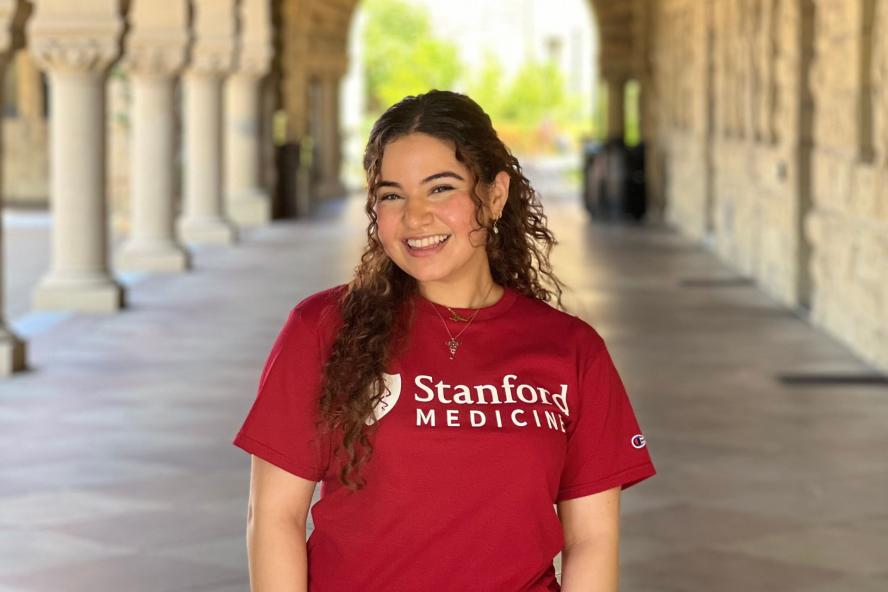Alumni Profile: Siwaar Abouhala

Siwaar Abouhala, A23, has long been interested in the intersection of medicine, public health, and advocacy. Recently named a 2025 Knight-Hennessy Scholar (KHS) to study medicine at Stanford University, Siwaar’s next step in her civic pathway begins this fall where she will prepare “to be a visionary, courageous, and collaborative leader who addresses complex challenges facing the world,” according to the KHS mission. But Siwaar is no novice at tackling complex challenges. Her time as an undergraduate at Tufts University studying community health, Arabic language and cultural studies, and biology, with a focus on community-engaged research, has honed her ability to address issues in maternal health and medicine that will serve her well at Stanford.
Siwaar’s interest in this work began in the Tisch Scholars program and the Maternal Outcomes for Translational Health Research (MOTHER) Lab at Tufts University School of Medicine during the COVID-19 pandemic. After witnessing firsthand the devastating effects of global health disparities, Siwaar found her niche at the intersection of these programs, translating Scholars seminars emphasizing identity and civic engagement to the MOTHER Lab’s focus on designing research studies to better understand and address health disparities. “I was drawn to research with a civic tilt, because it allowed me to not only get the data that we needed, but to present it in a certain way to audiences, so that they become aware and take action.”
Through the Tisch Scholars Program, Siwaar worked with the Massachusetts Immigrant & Refugee Advocacy (MIRA) Coalition, which included outreach for voter registration and the United States Census in 2020. Through this experience, and her prior advocacy work with Middle Eastern and North African (MENA) communities, Siwaar discovered that there was no category for MENA-identifying people on the Census. This omission directly affects the amount of research and national health information available on these communities, “it’s a domino effect where civic disparities spiral into health disparities... when you have an ultra-minority clumped into the majority, you miss out on their data completely.” Siwaar joined the push to add a MENA category to the 2030 Census, organizing events on the importance of civic representation on health outcomes and resources. These efforts, combined with decades of advocacy by MENA professionals and allies nationally, resulted in the official addition of a MENA box to the 2030 Census by the White House's Office of Management and Budget.
Building from her experiences with the MOTHER lab, Siwaar founded the largest undergraduate-run organization in the US focused on maternal health disparities: Maternal Advocacy & Research for Community Health (MARCH). With the guidance of Dr. Ndidiamaka N. Amutah-Onukagha at the Tufts School of Medicine, MARCH is still thriving today and is a testament to Siwaar’s lasting impact on campus. She was honored with a Presidential Award for Civic Life and the Senior Award for her leadership in addressing maternal health disparities at Tufts and in local communities.
“A lot of this motivation came from the support I was getting at Tisch College, where you are given opportunities to imagine the resources in the world that you want to live in… Tisch College provided a space where I was able to bring in my outside interest, which in this case was medicine and public health, and use a civic engagement lens to further amplify this work.”
Siwaar also became the first student on the Tisch College Community Research Center (TCRC) steering committee, marrying her interests in community-engaged research and public policy. She was the project lead and organizer of Project INSPIRE: Improving New Somerville Parent & Infant Resiliency & Engagement, a collaboration between TCRC, the City of Somerville’s SomerBaby Program, MARCH, and the Center for Black Maternal Health and Reproductive Justice, addressing health disparities among Black, Brown, and immigrant parents in Somerville, Massachusetts. Project INSPIRE surveyed expectant and new parents and used that data to provide resources to families both at Somerville Family Day and in the form of Nurture Kits, providing comprehensive resources for new infants and birthing people.
“It's rewarding to see how we can build these projects with communities and large universities to foster more equitable relationships between both institutions, but to also provide pathways for students to see that a career in medicine or a career in science, or whatever career they want to hold, can have civic impact.”
In her most recent post-Tufts position in the Medical and Population Genetics program at the Broad Institute of MIT and Harvard, Siwaar’s innate ability to gather experiences, build networks, and prioritize civic impact was put to great use. While working there, she discovered that the MENA community was significantly underrepresented in the data available. In response, Siwaar created Project MENA PEDIGREE: Progressing Equity, Diversity, & Inclusion in Genetic Research, Education & Empowerment, an academic-community research partnership between the Broad Institute and the Center for Arab Narratives and Arab Society of Genetic Counselors in Dearborn, Michigan, where she took “the lessons from Project INSPIRE, and adapted them to imagine: what does equitable science look like? What does civic medicine mean?”
The through line connecting Siwaar’s academic and post-undergraduate experiences is joining the principles of research, medicine, and civic engagement to address community needs, as defined by the community. She plans to continue this work during her time at Stanford Medical School as a Knight-Hennessy Scholar and to bring with her the lessons she has learned along the way. Siwaar believes it is “really important to take lessons from Tisch College, from Project INSPIRE, and from Project MENA PEDIGREE, and to translate them to this next chapter ahead.”